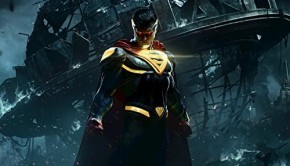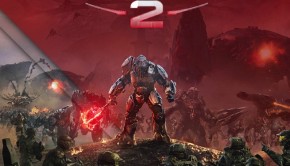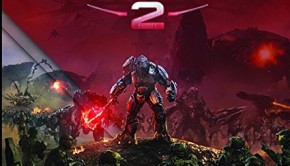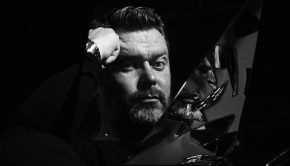Tilman Sillescu Interview: The Creativity of Dynamedion
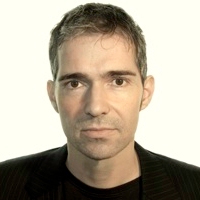 Dynamedion is the leading studio for soundtrack composition and sound design in the European video game industry. The company has pioneered orchestral recordings in game music with major scores to the SpellForce and Anno series. Having featured on nearly 200 projects to date, the company has branched out to encompass sound production for television, film, and mobile games too.
Dynamedion is the leading studio for soundtrack composition and sound design in the European video game industry. The company has pioneered orchestral recordings in game music with major scores to the SpellForce and Anno series. Having featured on nearly 200 projects to date, the company has branched out to encompass sound production for television, film, and mobile games too.
Here Dynamedion’s co-founder and creative director Tilman Sillescu gives an insight into the creative process of the company. He recollects the company’s major works on diverse series such as SpellBound, Anno, Settlers, Drakensang, and Mortal Kombat, drawing on common threads such as the importance of human performers and productive, focused teamwork. He also discusses several of Dynamedion’s new and upcoming soundtracks, namely Arcana: Gothic 4, Alan Wake, Black Prophecy, and Halo Legends.
Interview Credits
Interview Subject: Tilman Sillescu
Interviewer: Chris Greening
Editor: Chris Greening
Coordination: Chris Greening
Interview Content
Chris: Tilman Sillescu, many thanks for talking to us today. Now that Pierre Langer has introduced the company, we’d appreciate it if you could tell us more about the artistic side of Dynamedion. As creative director of the company, what does your role involve? In this role, what you developed Dynamedion to stand for artistically?
Tilman Sillescu: As creative director, I am mainly supervising the musical concept of our projects. My job normally starts after Pierre makes the contract with a client and basically is about three things. First of all, I have to communicate with our clients during the whole project, starting by finding out together what musical style is most suitable for their project, sending first layouts and defining a musical concept.
Second is composing many tracks for the game, normally starting with the main theme or motifs for main characters. Then I bring in our best composers for the certain style of the game. The third thing is to oversee the progress of all work done by our composers and to check if their tracks are matching our musical concept. Our composers send their tracks to me and if necessary we have some internal iterations — then I send them to our client and ask for their feedback.
What I try to do is to fulfill our clients request as well as we can by maintaining our Dynamedion style. The most important thing for me is that our music is inspired and serves the game in its best possible way.
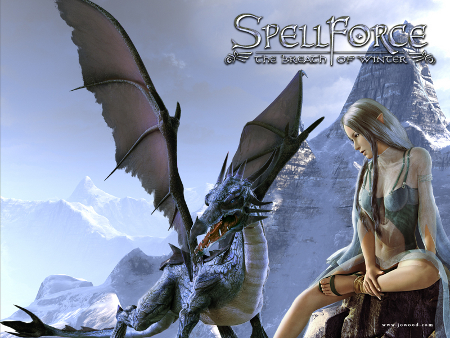
Chris: Dynamedion first came to widespread recognition for their works on the SpellForce series. Looking back on these scores, what do you think made them so appropriate in a contextual basis yet memorable on a stand-alone one?
Tilman Sillescu: When Pierre and I got the SpellForce job, we immediately knew that this was a big chance for us to prove our abilities. We were totally commited to this project and tried hard to achieve this big, epic fantasy feeling by our music. We used vocals in many tracks, and created our own elven language for our songs. I think the songs were very intense in their sadness — they were very popular with the fans of SpellForce. Many of them asked for musical sheets of these songs and even for the lyrics.
Chris: As mentioned already in Pierre Langer’s interview, SpellForce 2 and The Guild 2 were breakthroughs due to their use of full orchestral recordings. From your personal perspective, what was it like to record with orchestra on these titles and what did these recordings bring to both the music and in-game experience?
Tilman Sillescu: When I was on my first orchestral recording session with SpellForce 2, the first track they performed was my main theme, “Shadowsong”. When I listened to this, I almost cried for joy because it seemed so beautiful to me. In my opinion, you can never achieve such intense emotions by using samples only. There has to be a human touch in it. For the games, it was a great gain because this sound was very real and cinematic, so it attracted public attention.
After these projects, almost all of our bigger clients who wanted an orchestral soundtrack for their game booked a live orchestra. So to say, the use of live orchestra for a game soundtrack can increase the players emotions a lot, which is essential for many games.
Chris: Your music for ParaWorld was a breakthrough for you internationally. Was it an honour to receive international awards for this score? How do you think it influenced your subsequent productions.
Tilman Sillescu: ParaWorld was a very intense project for us. Pierre and I each composed 50% of the music, and we were totally enthusiastic about this crazy Jules Vernes-like game setting.
In 2007, we were lucky to recieve the G.A.N.G. Award in San Francisco for ParaWorld‘s Main Theme, and we were so stupid to have missed the ceremony. But still, it is one of my favorites of our work. It’s funny, but having said this, I think I remember that the G.A.N.G. Award for Paraworld brought us some attention from the American game industry, and somehow led towards our jobs for Strangleholdand Mortal Kombat.
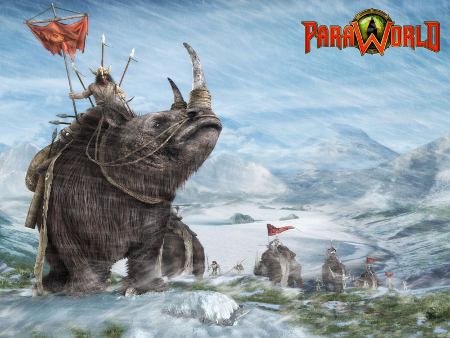
Chris: Electronic Arts’ BattleForge was also complemented by an epic orchestral score. How did you develop a suitable fantasy orchestration style on this score? In addition, how did your creative direction for the score enable the four different sets of cards — Fire, Frost, Nature, and Shadow — to be suitably portrayed?
Tilman Sillescu: BattleForge is not a typical fantasy game; its world is very crude and monstrous, not like a fairy-tale. Because of this, we headed for a very crude archaic Conan-like soundtrack with big orchestra, percussion and choir.
The four fractions were individually portrayed mostly by different instrumental colours. The Frost fraction has many frosty elements like chimes, anvils, choir or cymbals, while the Fire fraction has elements like wooden drums, tremolo strings and harsh brass. Nature is more lyrical in style with harp and some woodwinds, while Shadow has really weird elements like whispering voices and distorted sounds.
Chris: Projects such as BattleForge and Legend: Hand of God feature several composers working in a collaborative manner. From a creative perspective, how do you assign composers to suitable portions of scores? How are composers able to express their individuality while still creating a cohesive overall work?
Tilman Sillescu: I think as game composers, our main ambition must be to enhance the game’s atmosphere. Each one of us is aware that we will have to compose music that is totally suitable for the game and each individual track is always coherent with the other game tracks. Still, we are all individuals — there is always a possibility to create something unique and still match the mood of the game. Besides, it can be very inspiring for a composer to write a track based on a motif from another composer.
Thus, when I plan a project, I try to choose people who have proved their ability in the requested style, and assign the tracks to them that I think fit their personal style. We have some composers who are more talented at creating music that sounds friendly, opposed to ones who are more talented at creating music that sounds evil. I try to respond to their talents as well as I can.
Chris: On projects such as Mortal Kombat vs. DC Universe and Stranglehold, Dynamedion produced the music alongside a number of other studios. What was it like to work on such projects? What were the unique challenges of such productions and how did you overcome them?
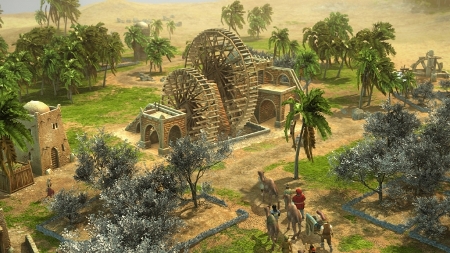
Tilman Sillescu: I really enjoy working with so many different teams — it is always a new experience to communicate with creative people, trying to find out their needs and helping to make the world within their game come alive with our music. With Mortal Kombat vs. DC Universe and Stranglehold, we had the opportunity to work together with other composers on the soundtrack that were not members of Dynamedion. This was great fun and very inspiring. For Stranglehold, I composed the main theme, which was performed at the Fifth Symphonic Game Music Concert in the Gewandhaus Leipzig. It was a great experience.
Chris: On the Anno series, Dynamedion has portrayed four historical periods — 1503, 1602, 1701, and, most recently, 1404 — with authentic music. How were you able to convey a sense of time and place with each instalment?
Tilman Sillescu: Concerning the Anno series, the individual time periods defined the music in many ways, but the technology when the soundtracks were composed defined it as well. Anno 1602 was composed a long time ago with MIDI sound, then Anno 1503 used orchestral samples. Subsequently, the budgets became bigger: Anno 1701 was performed by a live orchestra, while Anno 1404 used live orchestra and even a live choir too.
But sure, the environment of the game was even more important for the style of the soundtrack. For example, the Anno 1701 soundtrack was very friendly and classical — it is even played on German classical radio — while Anno 1404 needed a more serious approach for its setting. In the case of the latter, were two main factions — orient and occident. Therefore, we chose to bring in a choir for the spiritual aspect of the occident, and some exotic oriental live instruments like Saz, Duduk and ethnic percussion for the oriental side of the game.
Chris: Dynamedion has also been a regular contributor to The Settlers series since the fifth instalment. Under your creative direction, how do you feel the series’ music has developed under you? Do you feel the recently released The Settlers 7 features the pinnacle of the series’ music to date?
Tilman Sillescu: The Settlers series is developing in other ways than the Anno series. It is not so much following a historical theme, but it is set in a kind of timeless medieval world, like in fairytales. The changes are more about style, I would say.
Now, in The Settlers 7, Bluebyte chose a very nice and appropriate style — very comic-like. It reminds me a bit of animated movies like Shrek. We tried to create music that is not too epic or big for a friendly setting like this. However, we arranged it for live orchestra again, and we hired a live choir for the religious part of the game. One thing was new, as well: there is a title song, composed and performed by the British singer Cariina; very beautiful and dreamy. We worked with the motifs of this song throughout the entire soundtrack to guarantee coherency.
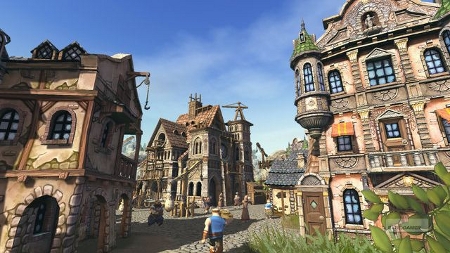
Chris: While you received the opportunity to record with orchestra on recent Anno and Settlers titles, there are a number of titles where you were had more restrictive budgets, for example Drakensangand Drakensang 2. After such achievements, did working on such projects seem like a step back or was it partly an enjoyable challenge?
Tilman Sillescu: To be honest, we would have loved to use live orchestra for Drakensang andDrakensang: The River of Time. It would have enhanced the quality and the sound of our soundtrack a lot. But we took it as a challenge, and tried to bring the samples to life as much as possible. To achieve this we brought in many live solo instruments, like guitar, several flutes, harp and live percussion, using the “mixed music mode” that Pierre elaborated upon. For the main theme of Drakensang, we hired singer Conny Kollet to perform the vocal part on the theme.
So in the end, I like our small ensemble tracks that use many of the live instruments the most. Certainly the epic tracks, like the combat music, would have sounded so much better with live orchestra — there is no way to deny that. But still, I think we achieved a very solid and intense sound even with the sampled orchestral tracks. As a game composer, you consistently have to deal with samples, so we try our best.
Chris: Moving on to recent arrangement projects, you recently led Dynamedion’s contribution to the animation Halo Legends. How did you interpret and integrate Martin O’Donnell and Michael Salvatori’s famous compositions into this relatively usual medium? What was it like to record with a top-class orchestra and chorus in Germany?
Tilman Sillescu: I am a big fan of the Halo soundtracks, so it was really a great pleasure to re-arrange these compositions. Actually the main issue was to give the music a more cinematic colour, so we arranged it for orchestra and choir. In the original soundtrack there are many electronic and synthetic sounds, and Microsoft asked us to modify this into a more symphonic approach that is suitable for the animated scenes. The Halo soundtrack is typical game music at its best, so we felt the need for some more narrative and cinematic tracks. So we composed some additional music based on the motifs of the original soundtrack. The recording session went very well and we soon knew that this music would fit excellently with the Halo Legends anime series.
Chris: Now that we’ve discussed Dynamedion’s productions extensively, it would be interesting to hear you provide some more insight about yourself personally. Could you tell us more about your background and how became involved in music production?
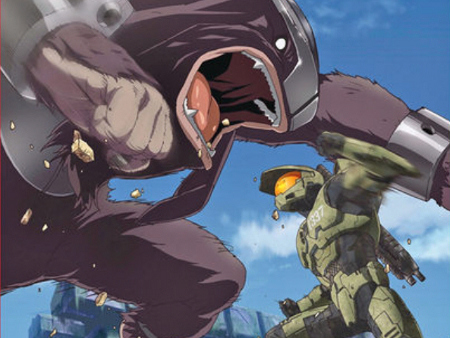
Tilman Sillescu: I was always very interested in music, especially film music. I tried playing movie themes by ear on the piano, took lessons for clarinet, guitar and piano, and soon wanted to become a musician. After school, I studied classical music at Mainz University, and jazz music later at Frankfurt University. During this time, I composed a lot of music for small ensembles that never was played! After that, I played in bands for a while, and taught Bachelor of Musical Arts at Mainz University.
However, somehow I felt bored most of the time — I think it was not the right thing for me. Then I met Pierre Langer. He took jazz guitar lessons from me, and soon we were discussing if there were possibilities of working together. Then we founded Dynamedion, which is definitely the right place for me.
Chris: Evidently, you have worked on numerous eminent projects over the years. Out of all the projects you have been involved in, which was most memorable for you and which are you most proud of?
Tilman Sillescu: This is always hard to say, because so many projects were exciting for me. SpellForcewas probably the most memorable project. I had a very long time to compose the music, it was also the first time I worked together with Pierre on such a huge project. And it was the first time we used a live orchestra, which was such a great experience.
Otherwise I still like many of our soundtracks when I hear them, but I think I like most the music we did for the upcoming MMO title Black Prophecy. It has a very epic sci-fi soundtrack with orchestra and choir. I really can’t wait for this game to come out.
Chris: Finally, I’d like to take the opportunity to look at two more of Dynamedion’s upcoming works? After five years of development, Alan Wake will finally be released for the Xbox 360. What should we expect from the score for the title? How did Dynamedion’s orchestral recordings influence the audio experience featured in this game?
Tilman Sillescu: For me, the Alan Wake score appears to be very sophisticated, with a kind of thoughtful and sad emotion. I really love the music of Petri Alanko — he did a great job using a small string orchestra to create a very intimate atmosphere, which is very suitable for the game. Our job was to arrange Petri’s music for string orchestra with solo oboe and to organize the recording session. Together with Petri and with Marc Yeend from Microsoft, we discussed the performance of the orchestra, and tried to achieve a certain fragile sound that really touches the player. And I think the “Staatskapelle Halle” did a great job, which was conducted by Bernd Ruf and recorded by Genuin. We were a great team, and had a lot of fun during the session.
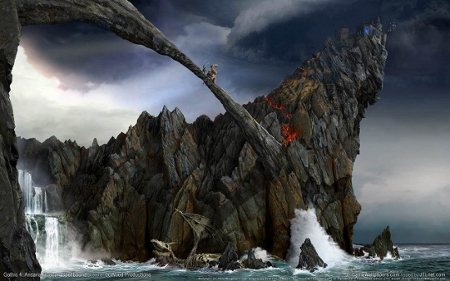
Chris: You also recently led the score for the impending Arcania: Gothic 4. How did Dynamedion come to inherit the composition for this production and how will the final score compare to previous instalments of the series? Will it build on the fantasy orchestral feel of Gothic 3, which you were also involved in?
Tilman Sillescu: I think the reason was that Spellbound, the development team for Arcania, had already worked with us in the past on Desperados 2. They asked us if we wanted to compose the soundtrack for Arcania: Gothic 4. First, I was a little bit frightened, because I am a big fan of theGothic 3 soundtrack (by our fellow composer and good friend Kai Rosenkranz) and I felt a kind of big shadow cast over the Arcania soundtrack. Actually, we had the idea to work together with Kai on it, and asked him about this; but Kai was occupied with his soundtrack for Risen, and didn’t want to do two projects as similar as these at one time. We had to do it on our own, which was not easy in the beginning.
I thought a lot about an appropriate way to achieve the typical Gothic feeling without copying the previous soundtrack too much. Eventually, I got the idea to create a main theme with a fresh approach. I made it more crude and archaic, which showed the harsher side of the gothic world, then changed into a melancholic middle part, by using a female solo voice and harp. At the end it turns crude again, with a touch of heroism in it. For the in-game music, I brought in three colleages of mine, Markus Schmidt, Alexander Roeder and Alex Pfeffer. The audio director of the game, Bastian Seelbach, gave us good advice to not be too epic with the in-game music. Because of this, we composed the in-game tracks very relaxed and calm, still with the typical gothic feel in it, using the main theme’s motifs to make the entire music congruos. As we are big fans of the Gothic series, we tried very hard to develop the best possible soundtrack for the game.
Right now the music has been implemented: last Friday we visited Spellbound, and I was very happy to listen to our music while playing the game. It has its own emotions and style, but I think it fits very well in the Gothic world. I hope the fans of the Gothic series will find that as well, because it is our biggest goal to really enhance the game experience emotionally.
Chris: Many thanks for your time today, Tilman Sillescu. Is there anything else you would like to say about Dynamedion and its projects? In addition, is there any message you would like to leave to readers around the world?
Tilman Sillescu: I don’t have much to add. Only perhaps one message for game music fans: I would recommend listening to some great “classical” music of the 20th century. As a game composer, I love listening to great composers like Stravinsky, Shostakovitch or Messiaen, just to mention a few. There is so much to discover, so don’t listen only to game or film music, because that music is all inspired by these geniuses!
Posted on May 12, 2010 by Chris Greening. Last modified on May 21, 2014.

